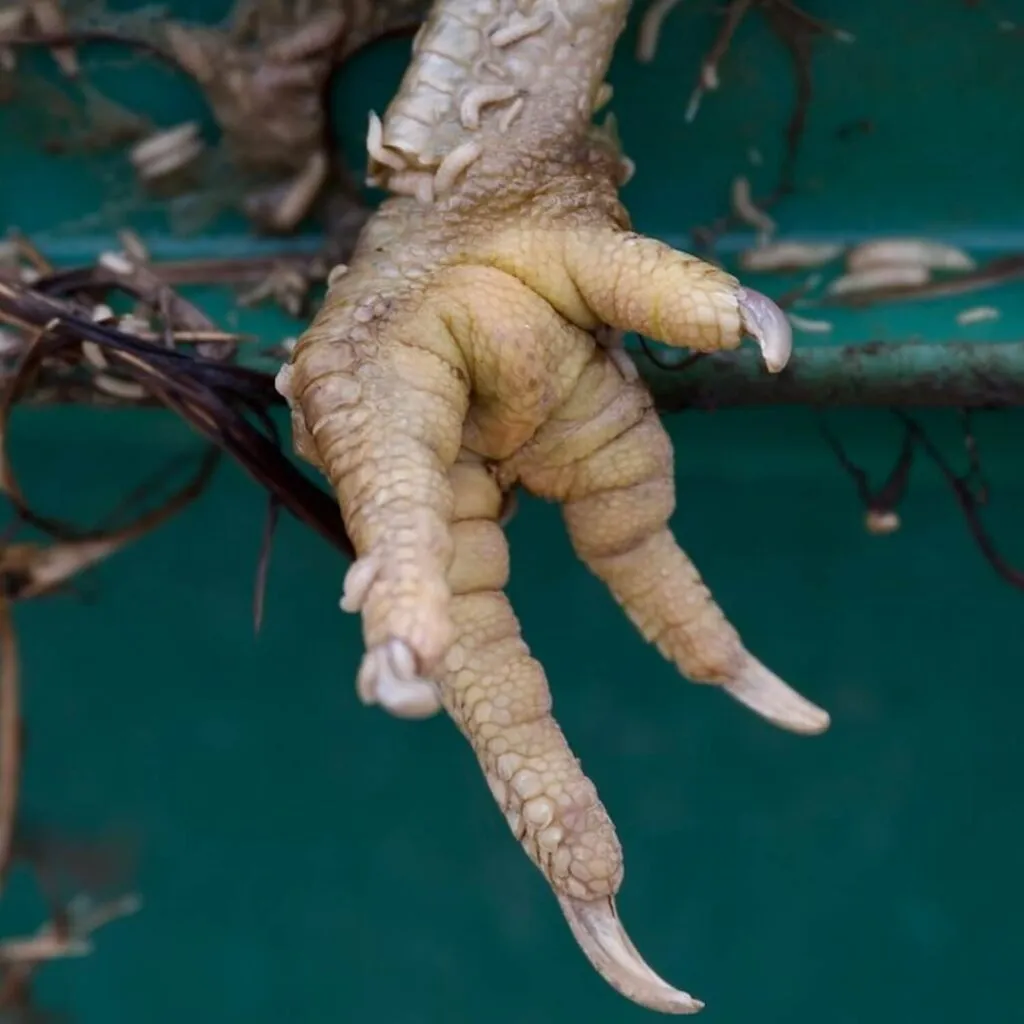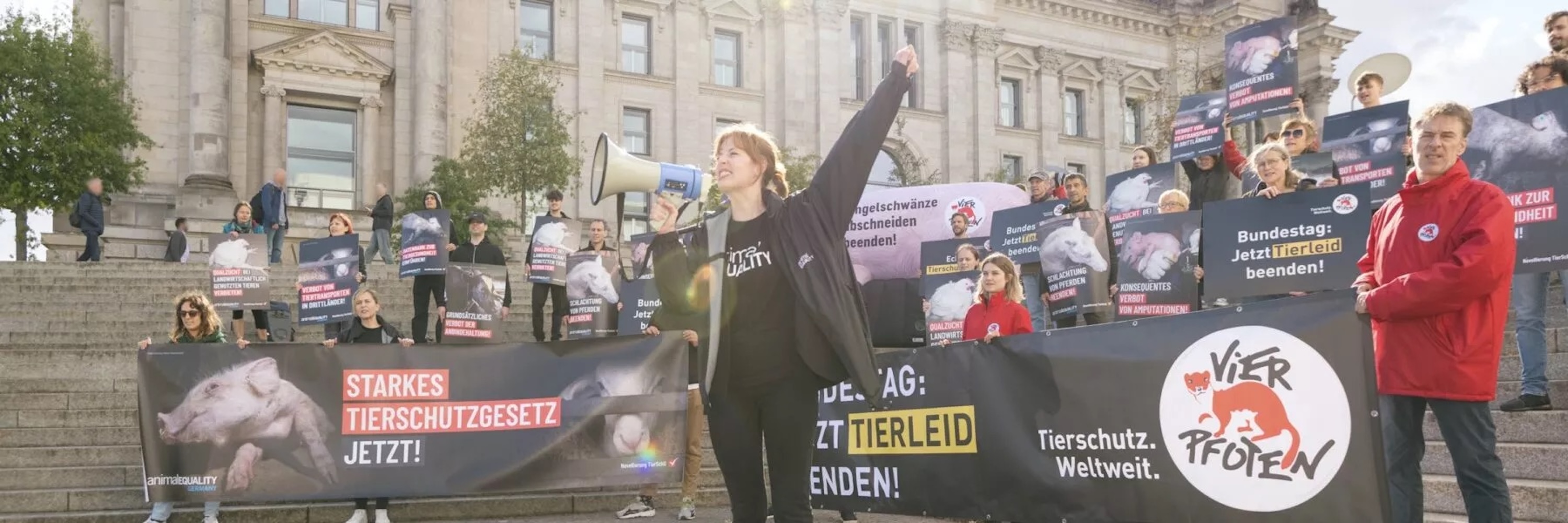

2024 in photos: 10 moments that shaped history for animals
In 2024, Animal Equality exposed cruelty, changed laws, and held the animal agriculture industries accountable across eight countries – all thanks to your incredible support. Whether you’ve signed petitions, made a generous donation, shared our plant-based messages, or taken action through emailing politicians, everyone involved in our work played a vital role in driving this movement forward.
In this special message, Sharon Núñez, President and Co-founder of Animal Equality, reflects on the incredible progress we made for animals in 2024.
Here are a few of the most powerful images we captured this year that reveal our top ten moments for animals in 2024!
1. Redefining tradition at Nepal’s Gadhimai Festival
At Nepal’s 2024 Gadhimai Festival – the world’s largest animal sacrifice – Animal Equality’s team revealed the reality that would have otherwise been hidden by walls, smog, and police bans. Thousands of animals were slaughtered, their final moments captured by our cameras.
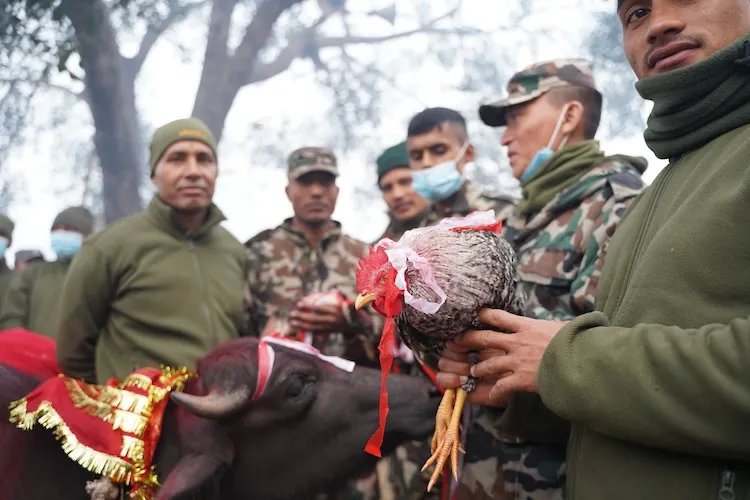
Buffaloes stood silently in line, witnessing the deaths of animals before them. We engaged with devotees, sharing a truth long forgotten: animal sacrifice was never part of the festival’s origins.
This work builds on a 2014 ban on live animal transport across the India-Nepal border, achieved through Animal Equality’s lobbying, which has helped to stop the number of animals being brought into the country for the sacrifice.
2. Mexico includes animals in its Constitution
In December 2024, Mexico transformed animal protection by embedding it into the country’s Constitution.
President Claudia Sheinbaum Pardo signed reforms to Articles 3, 4, and 73. As a result of these changes, Congress now has the power to legislate in matters of animal protection and welfare; school curricula will now include content on animal protection; and Mexico’s Government will be required to ensure animals are protected in law.
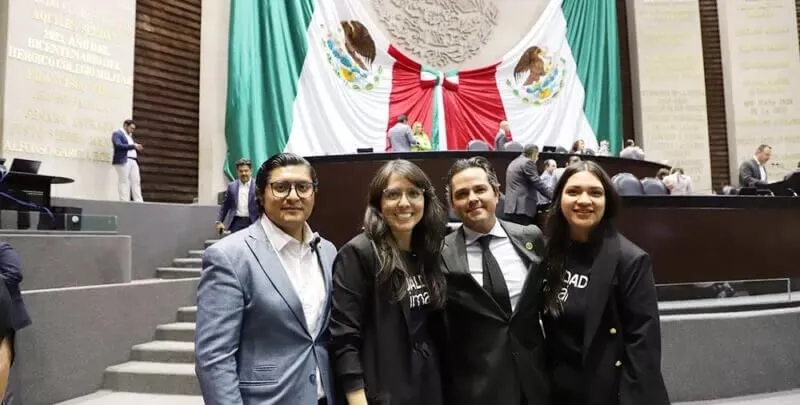
This comes after years of work by Animal Equality – conducting investigations, gathering over 100,000 petition signatures, and pressing lawmakers to act.
One of the most active groups in this process was our Animal Protectors, who carried out more than 82,000 peaceful face-to-face and digital actions, including demonstrations, sending emails to legislators, publications in networks, among others. Thank you!
With the reforms in place, animals will be protected under the nation’s highest laws, shaping how future generations will view animals’ place in the world.
3. Brazil: one step closer to ending male chick killing
Brazil’s egg industry stands at a proverbial fork in the road. In October, a government committee approved a bill – proposed at Animal Equality’s request – to stop the killing of male chicks in the egg industry.

Introduced by a congresswoman at Animal Equality’s request, the bill mandates the use of in-ovo sexing technology. This technology identifies the sex of embryos before they hatch, preventing male chicks from being born. In the egg industry, including right here in the UK too, male chicks are deemed ‘useless’ by the industry and usually killed because they cannot lay eggs or grow quickly enough for meat production.
The bill must pass through three more committees before reaching the Senate. If passed, Brazil will set a global example for addressing this controversial issue.
4. Exposing Aldi’s double standard
A transparent truck displaying a gestation crate – a cage so small a pregnant pig can’t turn around – toured Germany’s largest cities. The display exposed Aldi’s double standard: these crates are banned in Germany but remain part of the company’s U.S. supply chain.
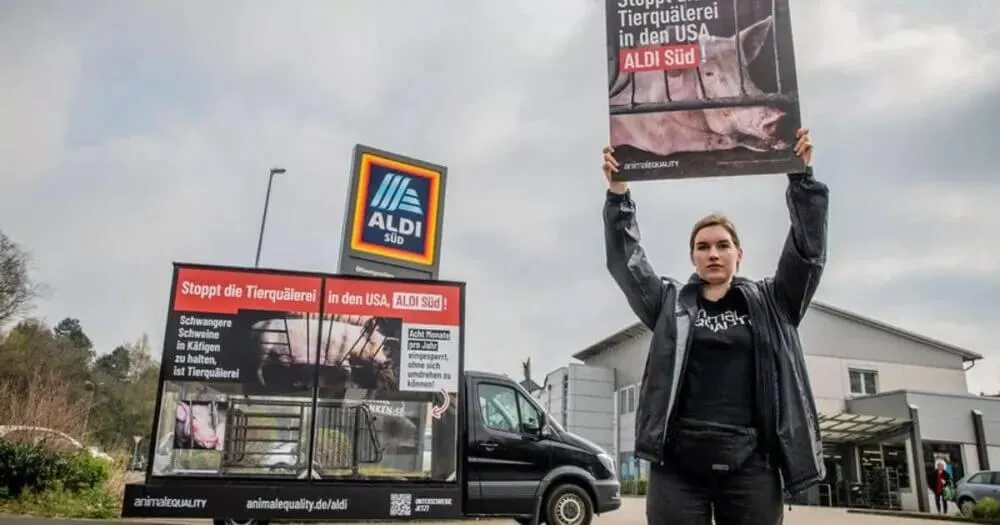
The tour ended with protests at Aldi’s headquarters, demanding global consistency in animal welfare. Meanwhile, U.S. protests added pressure as our digital volunteers, Animal Protectors, flooded Aldi’s leadership team with emails and raised awareness online.
5. Europe creates a role for animal protection
The European Union reshaped policy in 2024 by creating the Commissioner for Health and Animal Welfare. For the first time, responsibility for farmed animals moved from Agriculture to Health, redefining it as a public concern.
This change followed years of advocacy through the #EUforAnimals campaign, backed by over 60 organisations, including Animal Equality. With increasing public support, the EU could set a global example by prioritising animals over industry interests.
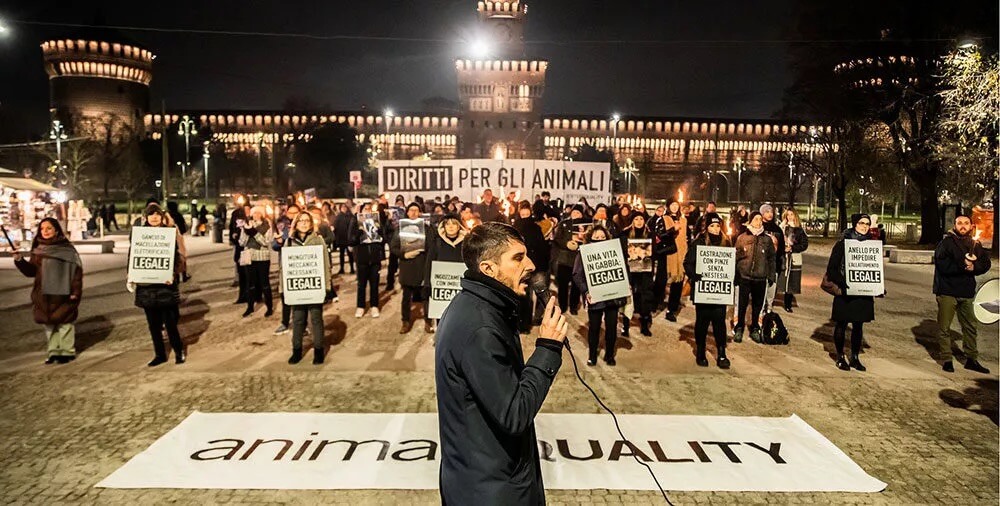
6. Taking on the UK salmon industry
In 2024, Animal Equality and our legal representatives appeared at the High Court where we were granted permission to challenge the North East Lincolnshire Council’s decision to approve the UK’s first fully on-land salmon mega-farm. If construction goes ahead, this farm would confine and slaughter an estimated one million fish a year. Due to our success in court, the construction of this farm is now being delayed, sparing hundreds of thousands of fish from being born into a life of misery in filthy tanks, surrounded by pipes and machinery, with no hope of ever swimming freely.
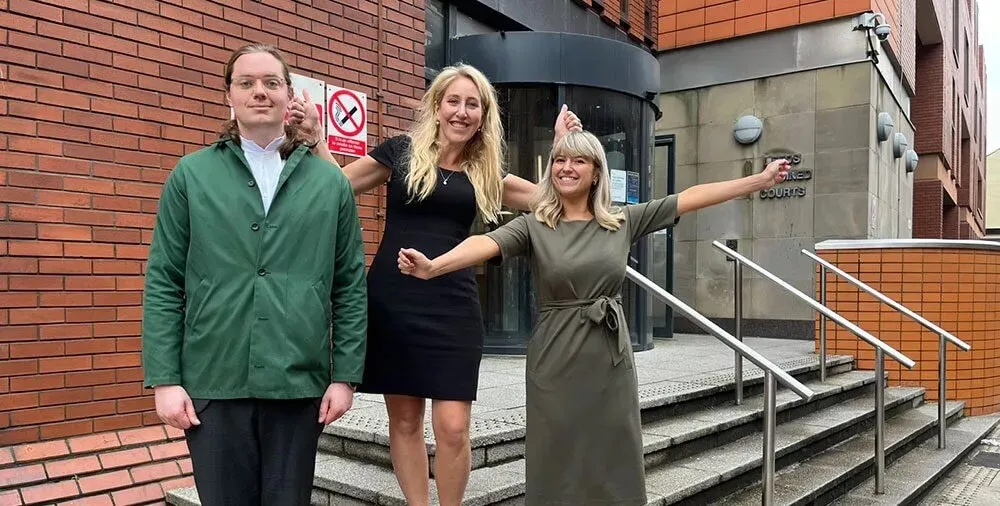
7. Love Veg takes on Times Square
In January 2024, a Love Veg billboard lit up Times Square, offering a free plant-based cookbook. Thousands engaged with the campaign, which showcased how plant-based eating protects animals and reduces factory farming’s impact.

Join Love Veg today for free recipes, tips, and tools to make compassionate eating easy and meaningful. Every plant-based meal challenges the factory farming industry and spares animals.
8. UK Labour Party promises foie gras import ban
Before the July 2024 General Election, the UK Labour Party pledged to ban foie gras imports made through force-feeding. Although production is illegal in the UK, imports keep these products in the market. This pledge came after Animal Equality activists flooded the Party’s leaders with emails, calling for a commitment.
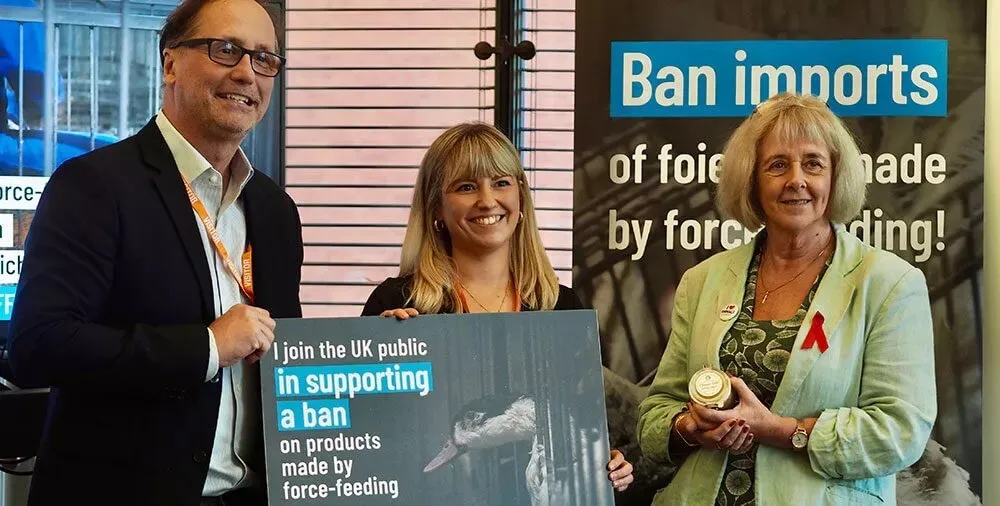
Animal Equality will continue working with Labour to ensure this promise becomes reality. Polls show nearly nine in ten Brits oppose the force-feeding of animals, making this a critical step toward aligning policies with public values.
9. Ending live animal exports in Great Britain
Great Britain has banned live animal exports for fattening or slaughter, halting the transport of animals abroad to be raised or killed.
Live exports involve shipping animals – such as sheep, cows, and pigs – long distances in cramped conditions. These journeys often last hours or even days, with animals facing extreme temperatures, limited access to food and water, and injuries from overcrowding. Many do not survive the trip.
The ban followed 50 years of work by Compassion in World Farming (CIWF) and Kent Action Against Live Exports (KAALE), supported by Animal Equality and other NGOs. Animal Equality contributed through protests, government meetings, and media efforts, including an article in The Ecologist by its UK Executive Director.
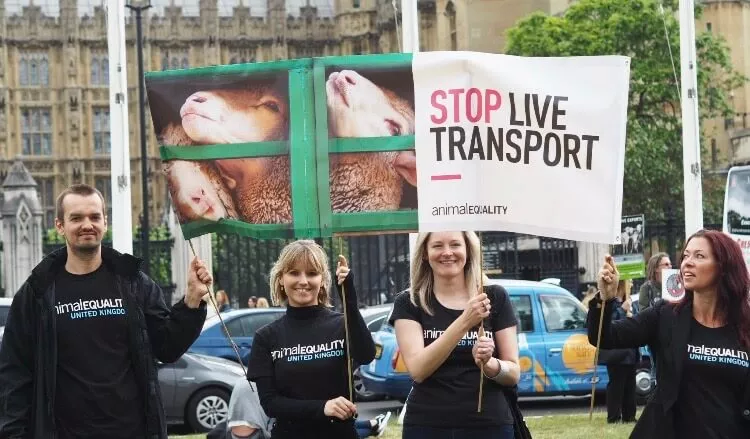
This ban will impact millions of animals each year, addressing a practice that has faced criticism for decades.
10. Animal Equality in the media
In 2024, Animal Equality’s work made headlines around the world:
Germany: Pig farm abuse aired on Das Erste, Germany’s top broadcaster.
Italy: Pig slaughter footage featured on TGR Lombardia and other outlets.
UK: Salmon and pig farm investigations were revealed via The Guardian, BBC Scotland, The Daily Mail, and The Times.
United States: Reuters covered Animal Equality’s campaign against Denny’s use of crates for pregnant pigs.
Global: Animal Equality’s campaign to remove foie gras from the Olympic VIP menu was covered by The Independent, Forbes, Vanity Fair, and Le Monde.

Take action for animals in 2025
Animal Equality’s progress in 2024 shows what’s possible – but there’s still more to do.
Become an Animal Protector: Join the movement! Hold governments and companies accountable through emails, social media actions, peaceful protests and more.
Join Love Veg: Discover and share with others free plant-based recipes, tips, and resources to make compassionate eating simple and impactful.
Recommended


